人教版七年级下册第三单元unit3重点短语语法句型
人教版七年级下册unit3重点知识巩固(教师版)
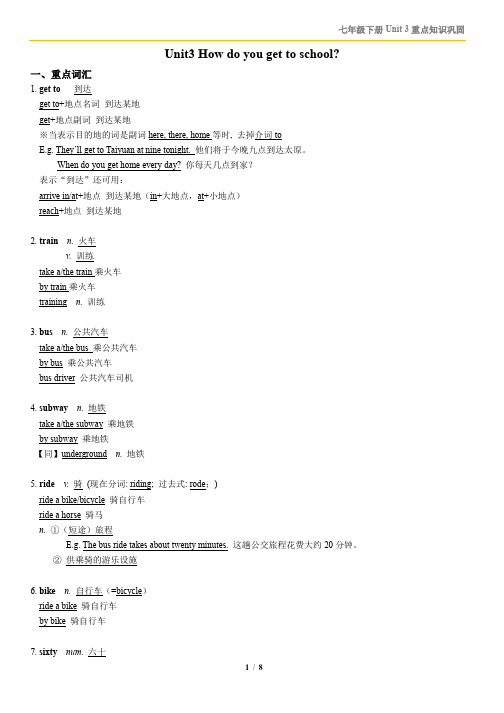
Unit3 How do you get to school?一、重点词汇1. get to 到达get to+地点名词到达某地get+地点副词到达某地※当表示目的地的词是副词here, there, home等时, 去掉介词toE.g. They’ll get to Taiyuan at nine tonight. 他们将于今晚九点到达太原。
When do you get home every day? 你每天几点到家?表示“到达”还可用:arrive in/at+地点到达某地(in+大地点,at+小地点)reach+地点到达某地2. train n. 火车v.训练take a/the train乘火车by train乘火车training n.训练3. bus n.公共汽车take a/the bus 乘公共汽车by bus 乘公共汽车bus driver 公共汽车司机4. subway n.地铁take a/the subway 乘地铁by subway 乘地铁【同】underground n.地铁5. ride v.骑(现在分词: riding; 过去式: rode;)ride a bike/bicycle 骑自行车ride a horse 骑马n. ①(短途)旅程E.g. The bus ride takes about twenty minutes. 这趟公交旅程花费大约20分钟。
②供乘骑的游乐设施6. bike n. 自行车(=bicycle)ride a bike 骑自行车by bike 骑自行车7. sixty num.六十sixteen num.十六sixtieth num.第六十sixteenth num.第十六8. seventy num.七十seventeen num.十七seventieth num.第七十seventeenth num.第十七9. eighty num.八十eight num.八eighth num.第八eighteen num.十八eightieth num.第八十eighteenth num.第十八10. ninety num.九十nine num.九ninth num.第九nineteen num.十九ninetieth num.第九十nineteenth num.第十九11. hundred num.一百①基数词+hundred,表示“几百”,hundred不变复数;five hundred 五百②hundreds of... 表示“成百上千的...”,后+可数名词复数;hundreds of students 成百上千的学生③若表示“几百几十几”,在百位与十位或个位数之间加and.nine hundred and ninety-nine 999※记忆口诀:模糊数目两有(有s有of); 确切数字两无(无s无of)类似用法词:thousand(千); million(百万); billion(十亿)12. minute n. 分钟;一分钟的路程;时刻a ten-minute ride / ten minutes’ ride 十分钟路程in a minute / wait a minute 稍等片刻in a few minutes 过一会儿think for a minute 想了一下a few minutes later 几分钟后【相关词拓展】秒: second;小时: hour秒针: second hand;分针: minute hand;时针: hour hand13. far adj.&adv.远的;远How far 多远(对距离提问)—数字+距离单位(5 kilometers.)— 5 minutes’ walk. / 5-minute walk.be far from ... 离......远far away 遥远as far as I know据我所知※How引导的特殊疑问词组用法及其回答14. new adj.新的;刚出现的the new 新生事物或人new to... 对......是新的 E.g. The work is new to me. 这种工作我从未做过。
人教版七年级下册英语Unit 3 知识点语法归纳总结

人教版七年级下册英语Unit 3 知识点语法归纳总结Unit 3 How do you get to school?In this unit。
we will learn how to talk about n and how to describe our daily commute to school.1.Phrases to remember:Get to school: Arrive at schoolTake the subway: Use the subway as nRide a bike: Use a bicycle as nHow far: The distance een two placesFrom home to school: The distance een home and schoolEvery day: DailyTake the bus: Use the bus as nLeave Beijing for Shanghai: Depart from Beijing to Shanghaieful sentences:How do you get to school。
I ride my bike to school.How far is it from your home to school?How long does it take you to get to school?For many students。
it is easy to get to school.age:1) How to express n:How do you get to school?When describing n。
we usually use ns such as "by" (without "a/the").BusThink ofeen。
Unit3词汇精讲及短语人教版七年级英语下册

1.get to 到达例句:你怎么到学校?(G7下,U3,P13) How do you get to school?【注意】:当地点是副词home/here/there等时,to要省略。
例句:到家要多久?(G7下,U3,P15) How long does it take to get home?【扩展】:get to= arrive in/at或reach arrive at+小地点arrive in +大地点reach +地点(及物动词直接接地点)2.train/trem/cn.火车------复数trains短语:go to...by train=go to... on a/the train= take a/ the train to ...乘火车去……例句:你怎么去学校?How do you go to school?I take the train the school.=I go to school by train/ on the train3.bus Cn.公共汽车--------复数buses短语:go to...by bus=go to... on a/the bus= take a/ the bus to ...乘公交车去……例句:他坐公交车上班。
He takes the bus to work=He goes to work by bus/on the bus.例句:你的朋友们坐公交车上学吗?Do your friends go to school by bus?4. subway Cn. 地铁------复数subways例句:我骑自行车去地铁站。
短语:go to...by subway=go to... on the subwaytake the subway to...乘地铁去......例句:我们乘地铁去公园we take the subway to the park.=we go to the park by subway/on the subway.5.ride vt.骑cn.旅程------过去式rode 单三形式rides-----现在分词riding 骑手(cn.) rider短语:ride a /the /one’s bike(s) to== go to …by bike=go to… on a /the bike 骑直行车去……骑马ride a horse ==go ridingI ride my bike to school every morning .6.bike/bak/cn.自行车-----复数bikes短语:ride a bike 例句:你是走路还是骑自行车呢?Do you walk or ride a bike?7.sixty num.六十-----复数sixties ----序数词sixtieth8. Seventy num. 七十-----复数seventies -----序数词seventieth 9. eighty num.八十-----复数eighties -----序数词eightieth 10. ninety num. 九十----复数nineties----- 序数词ninetieth 11. hundred /'h ndr d/num. 一百【注意】:hundred 前有数字时,hundred 不用复数,直接接可数名词复数,也不与of 连例句:2000名学生在这个学校There are 2000 students in the school.【注意】表示一个不确定数时,前面没有具体数字,其后加s ,与of 连用。
Unit3重难点讲解与练习人教版七年级英语下册
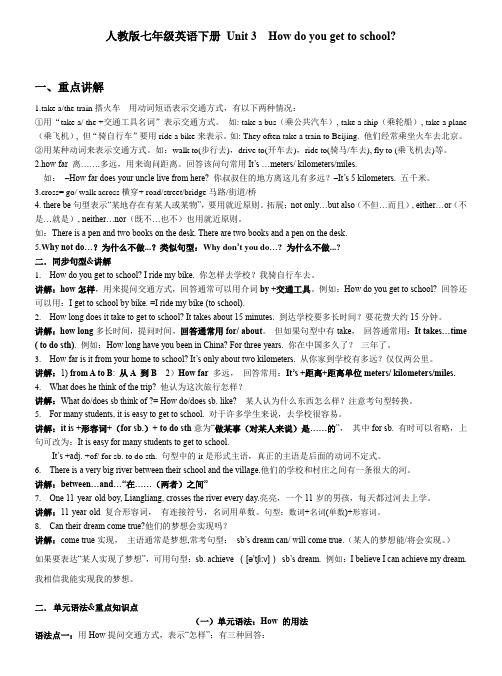
人教版七年级英语下册Unit 3 How do you get to school?一、重点讲解1.take a/the train搭火车用动词短语表示交通方式,有以下两种情况:①用“take a/ the +交通工具名词”表示交通方式。
如: take a bus(乘公共汽车), take a ship(乘轮船), take a plane (乘飞机), 但“骑自行车”要用ride a bike来表示。
如: They often take a train to Beijing. 他们经常乘坐火车去北京。
②用某种动词来表示交通方式。
如:walk to(步行去),drive to(开车去),ride to(骑马/车去), fly to (乘飞机去)等。
2.how far 离…….多远,用来询问距离。
回答该问句常用It’s …meters/ kilometers/miles.如:–How far does your uncle live from here? 你叔叔住的地方离这儿有多远?–It’s 5 kilometers. 五千米。
3.cross= go/ walk across横穿+ road/street/bridge马路/街道/桥4. there be句型表示“某地存在有某人或某物”,要用就近原则。
拓展:not only…but also(不但…而且), either…or(不是…就是), neither…nor(既不…也不)也用就近原则。
如:There is a pen and two books on the desk. There are two books and a pen on the desk.5.W hy not do…?为什么不做...?类似句型:Why don’t you do…? 为什么不做...?二.同步句型&讲解1.How do you get to school? I ride my bike. 你怎样去学校?我骑自行车去。
七年级英语下册第三单元

七年级英语下册第三单元知识点总结一、词汇与短语1. 动词- have:拥有,具有。
例如:I have a new book.(我有一本新书。
)- collect:收集。
例如:She collects stamps.(她收集邮票。
)- play:玩,演奏。
例如:I play the piano.(我弹钢琴。
)- show:展示,给……看。
例如:Can you show me your photos?(你能给我看看你的照片吗?)2. 名词- thing:事物,东西。
例如:What's that thing over there?(那边那个东西是什么?)- hobby:爱好。
例如:My hobby is reading.(我的爱好是阅读。
)- club:俱乐部。
例如:He is a member of the basketball club.(他是篮球俱乐部的成员。
)- story:故事。
例如:I like listening to stories.(我喜欢听故事。
)3. 其他- a lot of:许多,大量。
例如:She has a lot of friends.(她有很多朋友。
)- in one's free time:在某人的空闲时间。
例如:I often read books in my free time.(我经常在空闲时间读书。
)- be interested in:对……感兴趣。
例如:I'm interested in science.(我对科学感兴趣。
)二、语法与句型1. 一般现在时- 描述经常发生的动作或存在的状态。
例如:I usually go to school by bike.(我通常骑自行车上学。
)- 第三人称单数形式的变化:动词后加-s或-es。
例如:He watches TV every day.(他每天都看电视。
)2. 特殊疑问句- 结构:特殊疑问词+ 一般疑问句。
人教版七年级下册英语Unit 3 知识点语法归纳总结
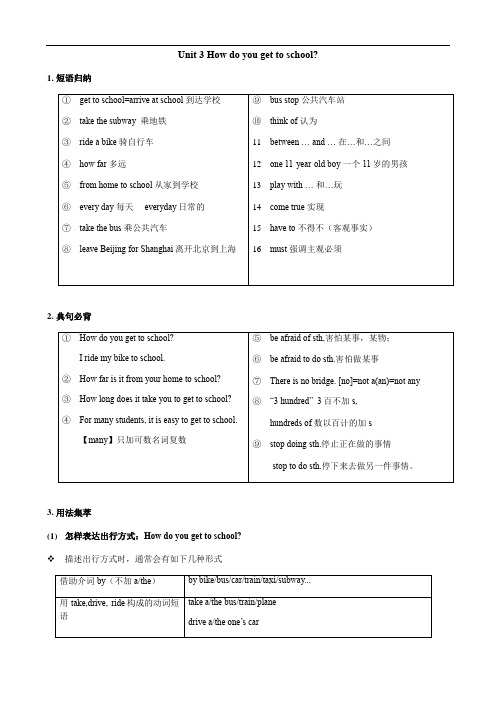
Unit 3 How do you get to school?1.短语归纳2.典句必背3.用法集萃(1)怎样表达出行方式:How do you get to school?❖描述出行方式时,通常会有如下几种形式注意:当交通工具的名词(如:bike, bus, train, car等)和by搭配时,它们前面不必加冠词;但当它们和on或in搭配时,它们之间要加冠词。
(2)基数词的表达法:基数词,表示数目或者数量的多少①one 到twelve,拼写和读音没有什么相似之处,无规律可言,应逐一进行记忆。
②thirteen到nineteen,表示“十几”,在个位数后加后缀-teen,读作/ti:n/。
注意thirteen, fifteen和eighteen的拼写。
③twenty到ninety,表示“几十”,以-ty结尾,但需注意下面几个词的拼写:twenty, thirty, forty, fifty, eighty。
④21~29直到91~99,表示“几十几”,用整十位加个位数表示,中间用连字符“-”把十位数与个位数连接起来。
例: 21→twenty-one; 35→thirty-five⑤one hundred意为“一百”,表示一百还可以用a hundred。
要表示200~900,用“具体数字+hundred”。
⑥例:200 →two hundred;900→ nine hundred注意:❖hundred前面若有具体的数词,则要用hundred的单数形式,而且其后不能跟of,此时表达确切的数字概念。
例:There are two hundred people in the square. 广场上有两百人❖hundreds of表示“数以百计的”,此时表达模糊的数字概念。
如:There are hundreds of people in the square. 广场上有好几百人(3)How far is it from your home to school?❖from ... to ... 意为“从...到...”,表示“由一点到另一点”,可用于时间、地点、数目等。
新人教版七年级英语下册unit3辞汇与句型

do you get to school你如何去上学staition.公交车站;train station火车站;a(train火车\bus\car\taxi\plane飞机\subway地铁)by(train\bus\car\taxi\plane\subway);By air坐飞机/by sea坐船;walk to school\go to school on foot 步行去上学;ride a bike\by bike.骑车;ride a bike to school/go to school by bike骑车上学way to (the library\School)去--的路;between---and---在----和---之间;less than\more than少于\多于;from---to---从---到---;cross the river跨河;Come true实现;lots of许多(homework/people/things东西);half an hour 半小时;do you get to school?你如何去上学?-I get to school by bus.\I take a bus to school.does your sister get to school?She gets to school on foot\He\She walks to school.often goes to school:by(bus\train\taxi\plane\air\subway)He takes a(bus\subway\train\plane\taxi)to school.Maria takes a school bus to school.坐校车去上学usually通常rides a bike to school.\Jacky usually goes to school by bike.5. Jimmy usually goes to school by bus,but sometimes有时on foot.\but sometimes he walks to school.father usually通常drives 开车to school.My father usually takes( the subway /a taxi)to work坐地铁/出租车去上班far is it from your home to school?从你家到学校有多远?-How far is it from the library to the museum?-How far is it from here?离这儿有多远?-It’s about 10 kilometers (away)远\It’s about 19minutes walk步程.8.(1)-How long does it take (you )to get to the library?去图书馆要花(你)多长时间?-It takes (me )about 10 minutes (to get to the library)去图书馆要花(我)大约十分钟..(2)-How long does it take you to walk to school?步行上学要花你多少时间?-It takes me about 20 minutes to walk to school.步行上学要花我大约二十分钟it far from here?离这儿远吗?-No, it’s only 10 minutes’(walk步程/bus ride车程/train ride火车车程)-it’s only 10 kilometers away远 .只有10千米远.-I t’s (quite far相当远\a little far有点远) from here.离这儿.-It’s not far from here.离这儿不远哪个bus may/can I take?我可以坐哪辆车?-You can take bus there.你可以做5路车去那儿。
新人教版七年级下册英语重点短语与重点句型

新人教版七年级下册英语重点短语与重点句型Unit 1 Can You Play the Guitar?Key Phrases:1.Be good with - have a way with2.Play the drums - play n3.Make friends (with sb) - e friends (with someone)4.Help sb with sth - assist XXX5.Be good at (doing) - excel at (doing)6.XXX - XXX7.Join the art club - e a member of the art club8.Talk to sb - converse with someone9.Call sb at。
- dial。
to XXX10.Want to do sth - desire to do something11.Play the guitar/piano - play the guitar/piano12.Play the lin - play the lin13.Play chess - play chess14.Play volleyball - play volleyball15.On the weekend - during the weekend16.Play games with sb - play games with someoneKey XXX Structures:1.Can you swim。
- No。
I can't.2.Can you play the guitar?3.I want to join the art club.4.What club do you want to join?5.You are very good at XXX.6.Sounds good。
but I like to draw too.7.Then join two clubs。
[全]人教版七年级英语下册unit3单词、知识梳理、词汇句型精讲
![[全]人教版七年级英语下册unit3单词、知识梳理、词汇句型精讲](https://img.taocdn.com/s3/m/423f4bb2f5335a8102d220e1.png)
人教版七年级英语下册unit3单词、知识梳理、词汇句型精讲Unit3 How do you get to school?1Unit 3单词(音标)train [tren] n.火车bus [bs] n.公共汽车;公交车subway ['sbwe] n.地铁take the subway 乘地铁ride [rad] v.骑n.旅程bike [ba k] n. 自行车ride a bike 骑自行车sixty ['skst] num.六十seventy ['sevnt] num.七十eighty ['et] num.八十ninety['nant] num.九十hundred ['hndrd] num.一百minute['mnt] n.分钟far [fɑ] adv. & adj. 远;远的kilometer ['kl,mit(r)] n.公里new [nju] adj. 新的;刚出现的every ['evr] adj. 每一;每个every day 每天by [ba] prep. (表示方式)乘(交通工具)by bike 骑自行车drive [drav] v. 开车car [kɑ] n.小汽车;轿车live[lv] v. 居住;生活stop [stɑ:p][stp] n. 车站;v. 停止think of 认为cross [krs] v.横过;越过river ['rv] n.河;江many ['men] adj. & pron.许多village ['vld] n.村庄;村镇between [b'twin] prep.介于…之间between…and…在……和……之间bridge [brd] n.桥boat [bt] n.小船ropeway ['rpwe] n.索道year [j] [ j] n.年;岁afraid ['fred] adj.害怕;惧怕like [lak] prep.像;leave [liv] v.离开dream [drim] n.梦想;睡梦v.做梦true [tru] adj.真的;符合事实的come true实现;成为现实Dave[deiv] 戴夫(男名2 Unit3 知识梳理◆短语归纳1. get to school 到达学校2. take the subway 乘地铁3. ride a bike 骑自行车4. how far 多远5. from home to school 从家到学校6. every day 每天7. take the bus 乘公共汽车8. by bike 骑自行车9. bus stop 公共汽车站10. think of 认为11. between…and…在…和…之间12. one 11-year-old boy 一个11岁的男孩13.play with…和…玩14. come true 实现15. have to 不得不◆用法集萃1. take…to…= go to…by…乘…去…2. How do/does sb get to…? 某人是怎样到…的?3. How far is it from…to…? 从…到…有多远?4. It takes sb. some time to do sth. 做某事花费某人多长时间。
人教版七年级英语下册Unit 3重点短语、语法汇总

人教版七年级下册英语第三单元知识点梳理

人教版七年级下册英语第三单元知识点梳理Unit 3 How do you go to school一、词汇与短语◆重点单词◆重点句子◆重点单词变形二、语法知识点A部分知识点1.与how构成的词组引导的特殊疑问句❶ how表示爱好、程度、看法等,意为“……怎么样?”。
eg:—How do you like the music?你觉得这首乐曲如何?—I like it very much.我非常喜欢它。
How is your Chinese?你的汉语如何?How do you like China?你认为中国怎么样?❷用于询问身体健康状况,意为“……怎么样?”。
eg:How do you do?你好!How are you?你(身体)好吗?❸ how提问交通方式。
其答语分三种情况:◆take a/the+表示交通工具的名词◆by +表示交通工具的单数名词◆on/in+限定词+表示交通工具的名词eg:How do you go to workevery day? 你每天怎样去上班?I take the subway to work. 我乘地铁去上班。
=I go to work by subway.=I go to work in the subway.❹表示感叹。
eg:How cold it is today!今天好冷啊!How hard they are working!他们在多么辛勤地劳动啊!How fast he runs!他跑得多快啊!❺表示某种方式、手段或方法。
eg:How do you spell it?你怎样拼写它?How did he go to schoolyesterday?他昨天是怎样去上学的?How do you know about it?你怎么知道这件事的?❻ how about用于询问或征询意见等,相当于what about,后接名词、代词或动词的-ing形式,意为“……怎么样?”。
人教版七年级下册Unit3知识点梳理+习题
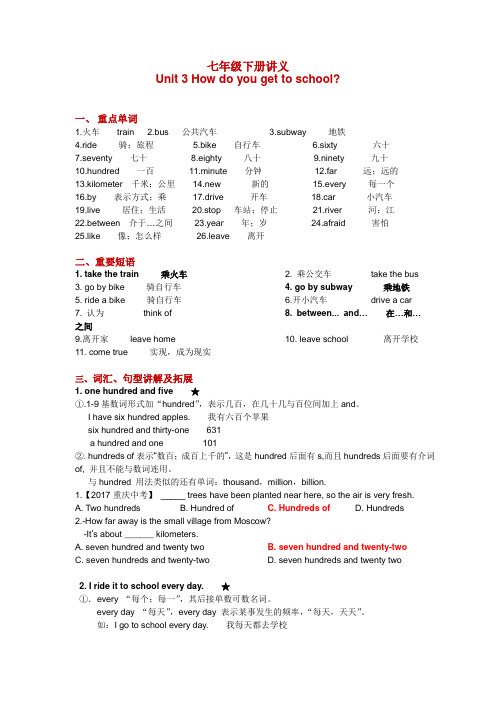
七年级下册讲义Unit 3 How do you get to school?一、重点单词1.火车train2.bus 公共汽车3.subway 地铁4.ride 骑;旅程5.bike 自行车6.sixty 六十7.seventy 七十8.eighty 八十9.ninety 九十10.hundred 一百11.minute 分钟12.far 远;远的13.kilometer 千米;公里14.new 新的15.every 每一个16.by 表示方式;乘17.drive 开车18.car 小汽车19.live 居住;生活20.stop 车站;停止21.river 河;江22.between 介于…之间23.year 年;岁24.afraid 害怕25.like 像;怎么样26.leave 离开二、重要短语1. take the train 乘火车2. 乘公交车take the bus3. go by bike 骑自行车4. go by subway 乘地铁5. ride a bike 骑自行车6.开小汽车drive a car7. 认为think of 8. between... and…在…和…之间9.离开家leave home 10. leave school 离开学校11. come true 实现,成为现实三、词汇、句型讲解及拓展1. one hundred and five ★①.1-9基数词形式加“hundred”,表示几百,在几十几与百位间加上and。
I have six hundred apples. 我有六百个苹果six hundred and thirty-one 631a hundred and one 101②.hundreds of表示“数百;成百上千的”,这是hundred后面有s,而且hundreds后面要有介词of, 并且不能与数词连用。
与hundred 用法类似的还有单词:thousand,million,billion.1.【2017重庆中考】_____ trees have been planted near here, so the air is very fresh.A. Two hundredsB. Hundred ofC. Hundreds ofD. Hundreds2.-How far away is the small village from Moscow?-It’s about ______ kilometers.A. seven hundred and twenty twoB.seven hundred and twenty-twoC. seven hundreds and twenty-twoD. seven hundreds and twenty two2. I ride it to school every day. ★①.every “每个;每一”,其后接单数可数名词。
人教版七年级英语下册第三单元知识点汇总

人教版七年级英语下册第三单元知识点汇总01、重点短语1. get to 到达2. walk to school=go to school on foot 步行去学校3. on foot 步行4. hundreds of 数以百计的5. every day 每天6. take the bus/train/subway 乘公交车/火车/地铁7. ride a bike 骑自行车=by bike8. how far 多远9. how long 多久/ 多长10. how soon 多久之后11. from home to school 从家到学校12. think of 认为,想起13. cross the river to school 穿过河去学校14. an 11-year-old boy 一个11岁的男孩15. between...and... 在......和......之间16. be afraid of 害怕17. go on a ropeway 乘坐索道18. be like 像19. come true 实现20. thanks for 因......而感谢21. have a good day 过得愉快02、重点句子Grammar Focus 句子How do you get to school?你怎样到学校?I ride my bike.我骑自行车。
How does she get to school?她怎样到学校?She usually takes the bus.她通常乘公交车。
How long does it take to get to school? 到学校要用多长时间?It takes about 15 minutes.大约要用15分钟。
How far is it from your home to school? 从你家到学校有多远?It’s only about two kilometers.只有大约两千米。
人教版七年级英语下册Unit 3知识点归纳总结和练习(含答案)
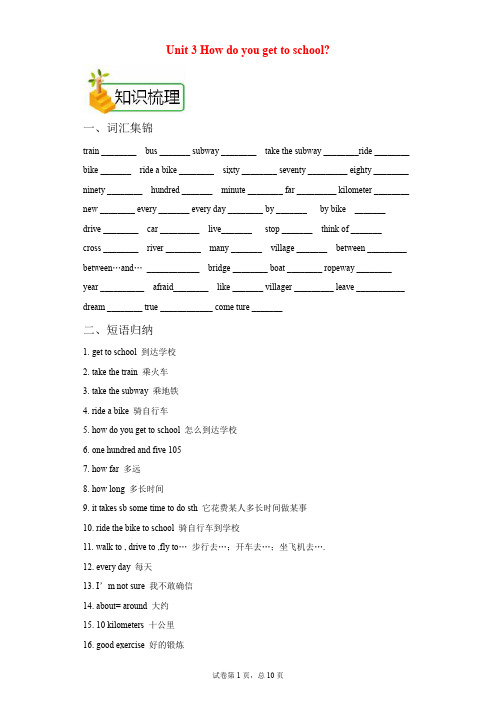
Unit 3 How do you get to school?一、词汇集锦train ________ bus _______ subway ________ take the subway ________ride ________ bike _______ ride a bike ________ sixty ________ seventy _________ eighty ________ ninety ________ hundred _______ minute ________ far _________ kilometer ________ new ________ every _______ every day ________ by _______ by bike _______ drive ________ car _________ live_______ stop _______ think of _______cross ________ river ________ many _______ village _______ between _________ between…and…____________ bridge ________ boat ________ ropeway ________ year __________ afraid________ like _______ villager _________ leave ___________ dream ________ true ____________ come ture _______二、短语归纳1. get to school 到达学校2. take the train 乘火车3. take the subway 乘地铁4. ride a bike 骑自行车5. how do you get to school 怎么到达学校6. one hundred and five 1057. how far 多远8. how long 多长时间9. it takes sb some time to do sth 它花费某人多长时间做某事10. ride the bike to school 骑自行车到学校11. walk to , drive to ,fly to…步行去…;开车去…;坐飞机去….12. every day 每天13. I’m not sure 我不敢确信14. about= around 大约15. 10 kilometers 十公里16. good exercise 好的锻炼17. drive his car to work 开车去上班18. in his father’s car 坐父亲的车19. need about 10 minutes to get to school 需要十分钟的时间到达学校20. what do you think of…=how do you like…你觉得怎么样21. cross the river 过河22. It is easy to get to school. 到达学校很容易。
七年级英语下册Unit3Howdoyougettoschool单词短语及重点句型新版人教新目标版
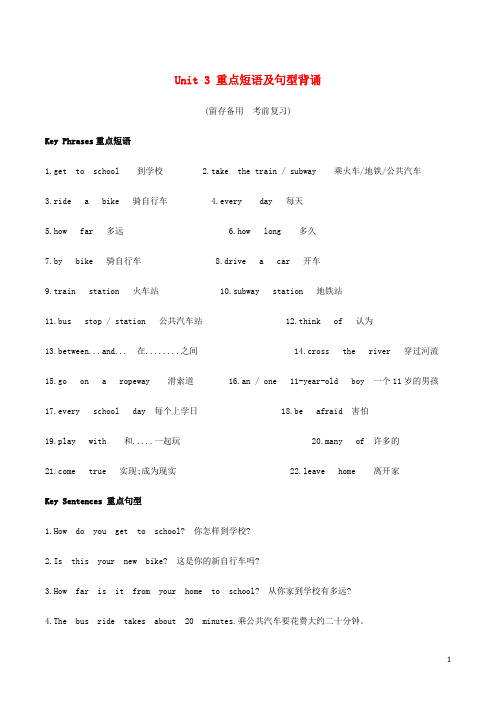
Unit 3 重点短语及句型背诵(留存备用考前复习)Key Phrases重点短语1.get to school 到学校2.take the train / subway 乘火车/地铁/公共汽车3.ride a bike 骑自行车4.every day 每天5.how far 多远6.how long 多久7.by bike 骑自行车 8.drive a car 开车9.train station 火车站 10.subway station 地铁站11.bus stop / station 公共汽车站 12.think of 认为13.between...and... 在........之间 14.cross the river 穿过河流15.go on a ropeway 滑索道 16.an / one 11-year-old boy 一个11岁的男孩17.every school day 每个上学日 18.be afraid 害怕19.play with 和.....一起玩 20.many of 许多的e true 实现;成为现实 22.leave home 离开家Key Sentences 重点句型1.How do you get to school? 你怎样到学校?2.Is this your new bike? 这是你的新自行车吗?3.How far is it from your home to school? 从你家到学校有多远?4.The bus ride takes about 20 minutes.乘公共汽车要花费大约二十分钟。
5.-- How long does it take you to get to school?你到学校要花费多长时间?--About 15 minutes by bike. It's good exercise.骑自行车大约十五分钟。
它是很好的锻炼。
人教版七年级下册unit 3 重点短语归纳背诵
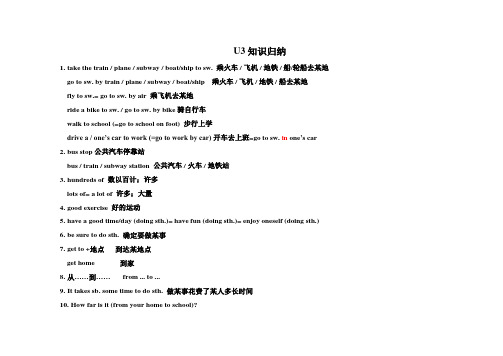
U3知识归纳1.take the train / plane / subway / boat/ship to sw. 乘火车 / 飞机 / 地铁 / 船/轮船去某地go to sw. by train / plane / subway / boat/ship 乘火车 / 飞机 / 地铁 / 船去某地fly to sw.= go to sw. by air 乘飞机去某地ride a bike to sw. / go to sw. by bike 骑自行车walk to school (=go to school on foot) 步行上学drive a / one’s car to work (=go to work by car)开车去上班=go to sw. in one’s car 2.bus stop 公共汽车停靠站bus / train / subway station 公共汽车 / 火车 / 地铁站3.hundreds of 数以百计;许多lots of= a lot of 许多;大量4.good exercise 好的运动5.have a good time/day (doing sth.)= have fun (doing sth.)= enjoy oneself (doing sth.)6.be sure to do sth. 确定要做某事7.get to +地点到达某地点get home 到家8.从……到…… from ... to ...9.It takes sb. some time to do sth. 做某事花费了某人多长时间10.How far is it (from your home to school)?It’s +距离./ It’s .... minutes’ walk/ ride.11.cross the river to school 过河去上学12.leave home / school 离开家 / 学校13.think of 认为;想起e true 实现;成为现实15.be afraid to do sthbe afraid of doing sth. 害怕做某事be afraid (that)+从句16.between ... and ... 在……和……之间17.an 11-year-old boy 一个11岁的男孩18.For many students 对于很多学生来说19.It’s +形容词for sb. to do sth. 做某事对某人来说是......20.leave A 离开A地leave for B 离开去B 地leave a for B 离开A地去B 地21.dream of/ about 梦想......。
人教版七年级英语下册unit3短语句型
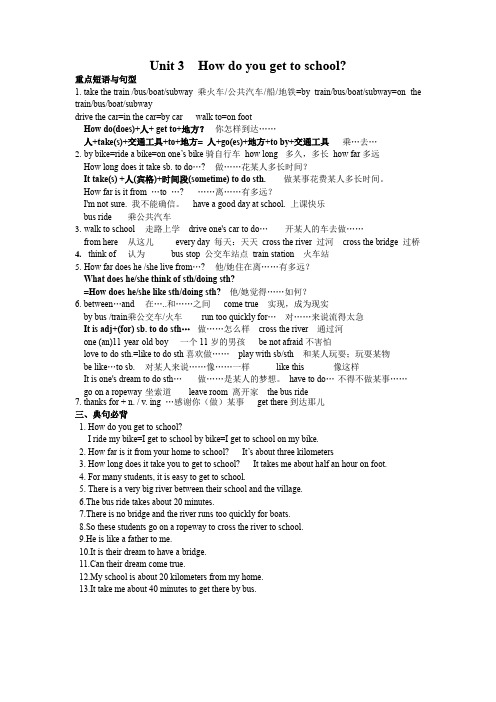
Unit 3 How do you get to school?重点短语与句型1. take the train /bus/boat/subway 乘火车/公共汽车/船/地铁=by train/bus/boat/subway=on the train/bus/boat/subwaydrive the car=in the car=by car walk to=on footHow do(does)+人+ get to+地方?你怎样到达……人+take(s)+交通工具+to+地方= 人+go(es)+地方+to by+交通工具乘…去…2.by bike=ride a bike=on one’s bike骑自行车how long 多久,多长how far多远How long does it take sb. to do…? 做……花某人多长时间?It take(s) +人(宾格)+时间段(sometime) to do sth.做某事花费某人多长时间。
How far is it from …to …? ……离……有多远?I'm not sure. 我不能确信。
have a good day at school. 上课快乐bus ride 乘公共汽车3.walk to school 走路上学drive one's car to do…开某人的车去做……from here 从这儿every day 每天:天天cross the river 过河cross the bridge 过桥4.think of 认为bus stop 公交车站点train station 火车站5.How far does he /she live from…? 他/她住在离……有多远?What does he/she think of sth/doing sth?=How does he/she like sth/doing sth?他/她觉得……如何?6. between…and 在…..和……之间come true 实现,成为现实by bus /train乘公交车/火车run too quickly for…对……来说流得太急It is adj+(for) sb. to do sth…做……怎么样cross the river 通过河one (an)11-year-old boy 一个11岁的男孩be not afraid不害怕love to do sth.=like to do sth喜欢做……play with sb/sth 和某人玩耍;玩耍某物be like…to sb. 对某人来说……像……一样like this 像这样It is one's dream to do sth…做……是某人的梦想。
人教版英语七年级下册第三单元短语语法知识点总结
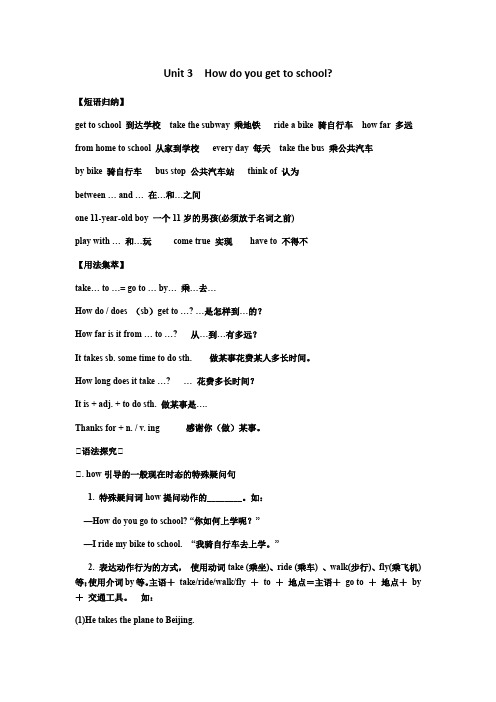
Unit 3How do you get to school?【短语归纳】get to school 到达学校take the subway 乘地铁ride a bike 骑自行车how far 多远from home to school 从家到学校every day 每天take the bus 乘公共汽车by bike 骑自行车bus stop 公共汽车站think of 认为between … and … 在…和…之间one 11-year-old boy 一个11岁的男孩(必须放于名词之前)play with … 和…玩come true 实现have to 不得不【用法集萃】take… to …= go to … by… 乘…去…How do / does (sb)get to …? …是怎样到…的?How far is it from … to …? 从…到…有多远?It takes sb. some time to do sth. 做某事花费某人多长时间。
How long doe s it take …? … 花费多长时间?It is + adj. + to do sth. 做某事是….Thanks for + n. / v. ing 感谢你(做)某事。
┃语法探究┃Ⅰ. how引导的一般现在时态的特殊疑问句1. 特殊疑问词how提问动作的________。
如:—How do you go to school? “你如何上学呢?”—I ride my bike to school. “我骑自行车去上学。
”2. 表达动作行为的方式,使用动词take (乘坐)、ride (乘车) 、walk(步行)、fly(乘飞机)等;使用介词by等。
主语+take/ride/walk/fly +to +地点=主语+go to +地点+by +交通工具。
如:(1)He takes the plane to Beijing.=He __________ _________Beijing.=He goes to Beijing by _____________.(2)She walks to school.=She goes to school _________ _________.Ⅱ. how far 与how long的区别how far是提问两地之间的_________,how long 用来提问_______________或某个事物的_________。
- 1、下载文档前请自行甄别文档内容的完整性,平台不提供额外的编辑、内容补充、找答案等附加服务。
- 2、"仅部分预览"的文档,不可在线预览部分如存在完整性等问题,可反馈申请退款(可完整预览的文档不适用该条件!)。
- 3、如文档侵犯您的权益,请联系客服反馈,我们会尽快为您处理(人工客服工作时间:9:00-18:30)。
southwest西南
northeast东北
northwest西北
这些词也是后接-ern变成形容词:
southeastern, northwestern…
5.名词+ly ==>形容词
friendly友好的
brotherly兄弟般的
sisterly姐妹般的
motherly母亲般的
4.What other animals do you like?
你还喜欢其他什么动物?
1)你还想学什么语言?
What other language(s)do you want to learn?
注意:what、某人的(Mike’s, my, your…)后面常用other+单数或复数名词。
2)我其他的那些朋友在五班。
---Because they’re cute.
注意:Why的疑问句要用because来回答。
1)---你为什么喜欢英语?
---因为它有趣。
---Why do you like English?
---Because it’s interesting.
在文章中表达时,because的句子不能单独使用。
during the day在白天(期间)
during the vacation在假期(期间)
1)他在中国停留期间,去过哪里?
Where did he go during his stay in China?
2)在暑假期间,你都做了些什么?
What did you do during the summer vacation?
C: English is interesting so many students in our class like it.
D: English is interesting. Many students in our class like it.
3. ---Do you like giraffes?
5)我发现学生们暑假过后很放松。
I find the students relaxed after the summer vacation.(作宾语补足语)
二.重点句子
1.Let’s see the lions.
let sb.(not)do sth.(不)让/(不)允许某人做某事
1)今晚咱们去看电影吧!
3)在那所国际学校你可以遇到很多来自其他国家的学生。
You can meet many students from other countries in that international school.
the others = the other +复数名词(有一定范围除去一个/部分剩余的)另一些
2)pretty用来描述长得好看的女性
3)beautiful -用来描述长得好看的女性(包括大人小孩)
4)handsome -用来描述长得好看的男性
5)cute -用来描述长得可爱的小孩
1.那边那个相貌好看的青年是谁?
Who is the good-looking young man over there?
教师:唐美美学生:杨雅兰年级:初二科目:语文
时间: 2013年7月30日七下三单元课次:11
一、教学目的与考点分析
1.三单元重难点单词短语
2.会简单表达自己的
一.单词短语
1.表达好看漂亮的单词:
1)good-looking用来描述任何长得好看的人(不论男女)
注意: Because不能和so连用,因为它们都是连词,引导的都是从句。正确的说法是:
A: Many students in our class like English because it’s interesting.
B: Because English is interesting many students in our class like it.
---Yes, I do.
---Why?为什么?
---Because they’re very interesting.
如果说:
---Do you like giraffes?
---No, I don’t.
---Why not?为什么不(喜欢)?
---Because they’re very shy.
= You are a student and he is a student, too.
either(副词)也不
2)你不喜欢足球,我也不喜欢。
You don’t like soccer and I don’t like it, either.
6.She likes to play with her friends and eat grass.她喜欢和朋友玩耍、吃草。
3)roof房顶,safe保险柜,直接加-s。
10.relax vt.使放松(后接“人”作宾语)
relax oneself(作动词时后常接人做宾语)
1)他通过听音乐来放松自己。
He relaxed himself by listening to music.
relaxing adj.令人放松的;
2)我喜欢这部电影因为它很令人放松。
4)请在黑板上清楚地写出那个句子。
Please write the sentence clearly on the blackboard.
6. another(三者或以上)另一个
1)这件衬衫我穿着有点小,你能给我看一下另一件吗?
This shirt is a little small for me. Could you please show me another one?
9.leaf n.叶子
1)复数的变化规则:以f或fe结尾的词,去掉f或fe,再加-ves。
例如:leaf, thief(小偷), shelf(架子), wolf, knife, half, wife, self…
2)handkerchief手绢,scarf围巾,可以直接加-s,也可以去掉f或fe,再加-ves。
like后面常跟并列形式。
like to do A and do B.或like doing A and doing B.
1)你周末喜欢打篮球、听音乐吗?
Do you like playing basketball and listening to music?
=Do you like to play basketball and listen to music?
Let’s go to the movies tonight!
2)让我看一看你的新手机。
Let me have a look at your new cell / mobile phone.
3)让他不要骑车去那里。
Let him not go there by bike.
2.---Why do you want to see the lions?
My other friends are in Class 5.
3)你的另一只手里有什么?
What’s in your other hand?
5.I like dogs, too.我也喜欢狗。
too, also adv(副词)也
注意它们的位置:
1)你是个学生,他也是。
You are a student and he is also a student.
2)你今天看上去很帅气。
You look smart today.
clever(有一些耍)小聪明
3.kind n.种类
a kind of一种
1)竹子是一种草。
Bamboo is a kind of grass.
all/different kinds of各种各样的
2)那家商店有各种各样的水果。
There are all/different kinds of fruits in that store.
5)他说话有点快。(修饰副词)
He speaks kind of / a little / a bit fast.
4.east , west, south , north n.东西南北
+ern变成形容词
eastern, western, southern, northern adj.
注意southern的读音。
kind of = a little = a bit有点儿,有几分(修饰形容词或副词)
3)我觉得熊猫有点懒。
I think pandas are kind of lazy.(修饰形容词)
4)这个数学题对他来说有点难。
This math problem is kind of / a little / a bit difficult to him.(修饰形容词)
C: Because English is interesting so many students in our class like it.(两个从句没有主句)
D: English is interesting, many students in our class like it.(两个主句用逗号隔开)
形容词+ly ==>副词
sad => sadly伤心地
clear => clearly清楚地
beautiful => beautifully漂亮地
careful => carefully细心地
angry => angrily生气地
happy => happily高兴地
3)你必须认真做作业。
You must do your homework carefully.
